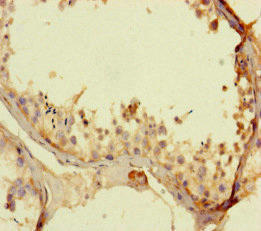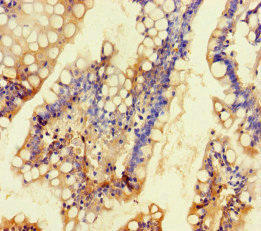Description
| Antibody Name: | KCNK16 Antibody (PACO46958) |
| Antibody SKU: | PACO46958 |
| Size: | 50ug |
| Host Species: | Rabbit |
| Tested Applications: | ELISA, IHC |
| Recommended Dilutions: | ELISA:1:2000-1:10000, IHC:1:20-1:200 |
| Species Reactivity: | Human |
| Immunogen: | Recombinant Human Potassium channel subfamily K member 16 protein (259-309AA) |
| Form: | Liquid |
| Storage Buffer: | Preservative: 0.03% Proclin 300 Constituents: 50% Glycerol, 0.01M PBS, PH 7.4 |
| Purification Method: | >95%, Protein G purified |
| Clonality: | Polyclonal |
| Isotype: | IgG |
| Conjugate: | Non-conjugated |
 | Immunohistochemistry of paraffin-embedded human testis tissue using PACO46958 at dilution of 1:100. |
 | Immunohistochemistry of paraffin-embedded human small intestine tissue using PACO46958 at dilution of 1:100. |
| Background: | Outward rectifying potassium channel. Produces rapidly activating and non-inactivating outward rectifier K(+) currents. |
| Synonyms: | Potassium channel subfamily K member 16 (2P domain potassium channel Talk-1) (TWIK-related alkaline pH-activated K(+) channel 1) (TALK-1), KCNK16, TALK1 |
| UniProt Protein Function: | KCNK16: Outward rectifying potassium channel. Produces rapidly activating and non-inactivating outward rectifier K(+) currents. Belongs to the two pore domain potassium channel (TC 1.A.1.8) family. 4 isoforms of the human protein are produced by alternative splicing.Protein type: Membrane protein, integral; Membrane protein, multi-passChromosomal Location of Human Ortholog: 6p21.2Cellular Component: integral component of plasma membrane; plasma membraneMolecular Function: potassium channel activity; potassium ion leak channel activity; protein binding; voltage-gated ion channel activityBiological Process: potassium ion transport; stabilization of membrane potential |
| UniProt Protein Details: | |
| NCBI Summary: | The protein encoded by this gene belongs to the family of potassium channel proteins containing two pore-forming P domains. This channel is an open rectifier which primarily passes outward current under physiological K+ concentrations. This gene is expressed predominantly in the pancreas and is activated at alkaline pH. Several alternatively spliced transcript variants encoding different isoforms have been identified for this gene. [provided by RefSeq, Sep 2008] |
| UniProt Code: | Q96T55 |
| NCBI GenInfo Identifier: | 205360971 |
| NCBI Gene ID: | 83795 |
| NCBI Accession: | NP_001128577.1 |
| UniProt Secondary Accession: | Q96T55 |
| UniProt Related Accession: | Q96T55 |
| Molecular Weight: | |
| NCBI Full Name: | potassium channel subfamily K member 16 isoform 1 |
| NCBI Synonym Full Names: | potassium two pore domain channel subfamily K member 16 |
| NCBI Official Symbol: | KCNK16 |
| NCBI Official Synonym Symbols: | TALK1; TALK-1; K2p16.1 |
| NCBI Protein Information: | potassium channel subfamily K member 16 |
| UniProt Protein Name: | Potassium channel subfamily K member 16 |
| UniProt Synonym Protein Names: | 2P domain potassium channel Talk-1; TWIK-related alkaline pH-activated K(+) channel 1; TALK-1 |
| Protein Family: | |
| UniProt Gene Name: | KCNK16 |
| UniProt Entry Name: |






